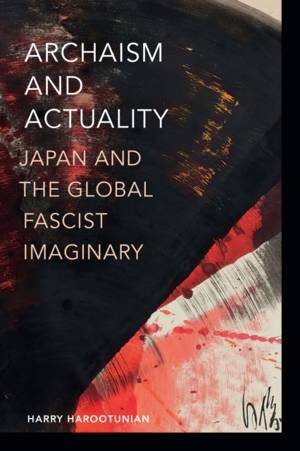
Bedankt voor het vertrouwen het afgelopen jaar! Om jou te bedanken bieden we GRATIS verzending (in België) aan op alles gedurende de hele maand januari.
- Afhalen na 1 uur in een winkel met voorraad
- In januari gratis thuislevering in België
- Ruim aanbod met 7 miljoen producten
Bedankt voor het vertrouwen het afgelopen jaar! Om jou te bedanken bieden we GRATIS verzending (in België) aan op alles gedurende de hele maand januari.
- Afhalen na 1 uur in een winkel met voorraad
- In januari gratis thuislevering in België
- Ruim aanbod met 7 miljoen producten
Zoeken
€ 164,95
+ 329 punten
Uitvoering
Omschrijving
In Archaism and Actuality eminent Marxist historian Harry Harootunian explores the formation of capitalism and fascism in Japan as a prime example of the uneven development of capitalism. He applies his theorization of subsumption to examine how capitalism integrates and redirects preexisting social, cultural, and economic practices to guide the present. This subsumption leads to a global condition in which states and societies all exist within different stages and manifestations of capitalism. Drawing on Japanese philosophers Miki Kiyoshi and Tosaka Jun, Marxist theory, and Gramsci's notion of passive revolution, Harootunian shows how the Meiji Restoration of 1868 and its program dedicated to transforming the country into a modern society exemplified a unique path to capitalism. Japan's capitalist expansion in the nineteenth and twentieth centuries, rise as an imperial power, and subsequent transition to fascism signal a wholly distinct trajectory into modernity that forecloses any notion of a pure or universal development of capitalism. With Archaism and Actuality, Harootunian offers both a retheorization of capitalist development and a reinterpretation of epochal moments in modern Japanese history.
Specificaties
Betrokkenen
- Auteur(s):
- Uitgeverij:
Inhoud
- Aantal bladzijden:
- 304
- Taal:
- Engels
- Reeks:
Eigenschappen
- Productcode (EAN):
- 9781478020363
- Verschijningsdatum:
- 17/11/2023
- Uitvoering:
- Hardcover
- Formaat:
- Genaaid
- Afmetingen:
- 152 mm x 229 mm
- Gewicht:
- 607 g

Alleen bij Standaard Boekhandel
+ 329 punten op je klantenkaart van Standaard Boekhandel
Beoordelingen
We publiceren alleen reviews die voldoen aan de voorwaarden voor reviews. Bekijk onze voorwaarden voor reviews.









